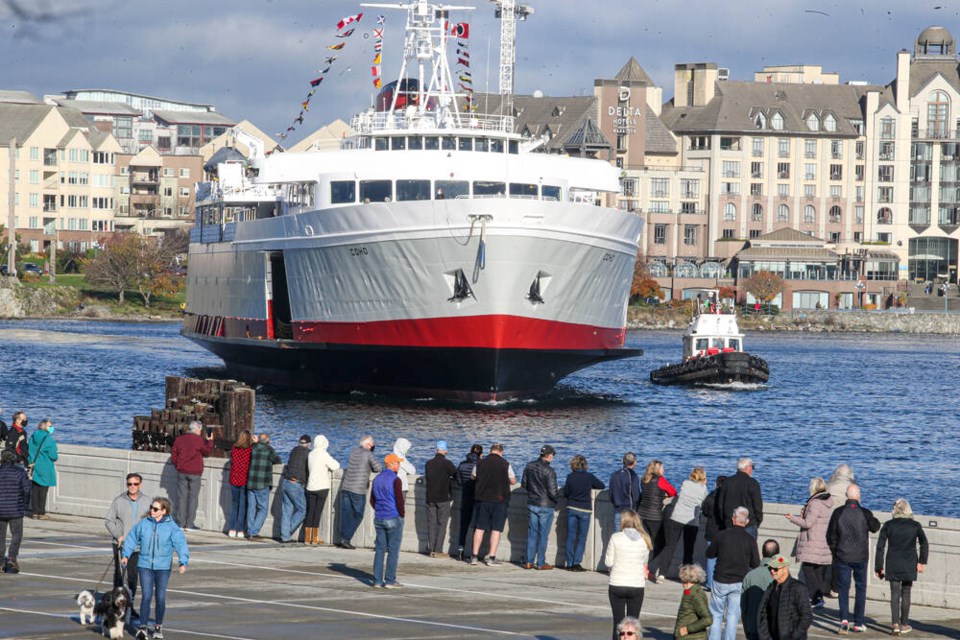As the world ground to a halt in March 2020, Angela and Don Ritter bolted back from Arizona as fast as their 40-foot motor home would take them.
Fleeing north to Canada was like driving through a lifeless Zombieland. “There was nobody on the I-5,” Don says.
“When we passed through Sacramento, the streets were empty,” Angela adds.
The Metchosin couple made it to Port Angeles just in time to catch the very last sailing of the Coho ferry to Victoria. After that, Juan de Fuca Strait might as well have been as wide as the Pacific, nothing crossing from one side to the other.
On Monday morning, the Ritters were back at Victoria’s Coho terminal, first in line for the Black Ball vessel’s first paying trip in almost 20 months. It was the day they and hundreds of thousands of other snowbirds have been waiting for, when the U.S. border finally opened to double-vaccinated Canadian tourists arriving by land and boat. “We came back on the last ferry, and we’re going out on the first,” Angela said.
And jeez, what a festive scene it was, under a blue sky with just one dark cloud (that we’ll get to later). Dozens watched from shore as a flotilla of small craft guided the ferry into the harbour.
In front of the terminal a lone piper played a medley of The Maple Leaf Forever and America The Beautiful. Someone waved a big Canadian flag.
In the jam-packed parking lot, giddy passengers — some already wearing shorts, their bony white legs anticipating the southern sun — exchanged fist bumps before scuttling back to their vehicles to prepare for boarding.
When the Coho docked, 40-year Black Ball employees who had been isolated on opposite sides of the strait greeted one another like the old friends they were.
That’s what we sometimes forget, that for many, such cross-border service have been the links that allow personal relationships to thrive. Among Monday’s crowd was Victoria’s Angela Geisler, eagerly awaiting boyfriend Steve Mullensky of Port Townsend, Washington.
She had seen him once, briefly, after Canada opened its border to Americans a couple of months ago, but other than that, the pandemic had kept them apart.
“It has been really tough,” she said while waiting for him to emerge. “We FaceTime, FaceTime, FaceTime.”
Likewise, what had the Ritters most excited was not the prospect of a warm winter, but the anticipation of reuniting with friends in Yuma, Arizona, where they have been wintering — save for last year — since 2009.
“Just the camaraderie, that is what we miss the most,” Angela says. “We have more friends down there than we do here.” Don, who was a log-home builder in Nanaimo before the couple moved to Metchosin a few years ago, says he has missed the jam sessions with other musicians in Yuma.
They’re hardly the only ones who have lived that lifestyle. The question now is how many will pick up where they left off.
In 2014 — that is, in the Before Times — TD Economics estimated 500,000 snowbirds spend significant time in the U.S. each year. Will that resume, or will leery Canadians take a you-go-first approach to international travel?
The Ritters figure they’re OK. They park their motor home (and the car it tows) on a rented one-acre lot that they have to themselves. Their friends are all double (and sometimes triple) vaxxed. “We can socially distance just as easily there,” Don says.
Others, apparently, share their confidence: The Coho’s first seven trips south have been booked solid with snowbirds.
It was a different story coming in the other direction, though. The 115-vehicle ferry disgorged just 14 cars, a semi and a dozen walk-on passengers in its first trip to Victoria since March 2020.
The low demand is being blamed on Ottawa’s requirement that anyone arriving in Canada provide a recent negative COVID PCR (polymerase chain reaction) test result.
The cost and logistical challenges have been enough to deter day-trippers and those who just want to pop across the strait for the weekend.
Reopening the border in those circumstances is like saying it’s OK to go back in the pool, but only if you swim with an anvil under your arm.
With border communities across Canada calling the requirement overkill, word out of Ottawa is that the rules could change soon.
That’s the aforementioned dark cloud. Already, the PCR requirement played a big role in the decision to pull the plug on the Clipper ferry from Seattle in October, less than a month after it resumed.
The Clipper won’t return until the spring. Ditto for the Sidney-Anacortes ferry.
As we have learned over the past 20 months, we can’t take these links for granted.



